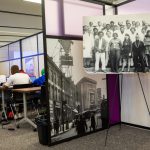In the early 2000s, Iraq was a dangerous place with ongoing sectarian violence, bombings and roadside explosions. Despite the risk, Mustafa Ali would take a bus from his hometown, Ramadi, to the University of Anbar to take classes.
One day, a roadside bomb exploded along his route, but he managed to escape with only minor injuries. His family pled with him to stop risking the dangerous trip to school, but Ali continued to pursue his education.
“Iraq has been bleeding since years ago,” Ali said. “The situations over there are full of catastrophes since 1980 up to now. I was living with my family all this time. We were seeing all these dangerous activities – we lived it.”
As he first completed his bachelor’s degree in English Language and Literature and followed it with a master’s degree in American Literature, Ali decided he had to do something to help his family. Decades of war and unrest had impacted Iraq’s economy and, consequently, his father’s income.
“I rushed to international organizations and introduced myself to them.” Ali said. “I told them that I would love to work with them and do public service.”
Ali worked for the US Agency for International Development as a human resources officer and later a human resources manager for International Relief and Development Inc.’s Community Stabilization program. With his income, he could help his family buy food.

Life changed again when the Islamic State of Iraq and Syria (ISIS) formed. In early 2014, the Iraqi army and Islamic fighters battled for control of Ramadi. Some of the Islamic fighters came to Ali’s home and presented him with a choice: either go now, leaving everything behind, or join them and fight the Iraqi army. Ali and his family left their home behind and moved to another neighborhood in Ramadi. Eventually, as the conflict consumed more of the city, they moved north to the Kurdistan region.
“Then, after all the wars and very complicated situations and hardship,” he said, “I decided to seek another country, a better life, stability, success.”
Ali applied for immigration in March 2014. He applied not knowing where in the world he might, hopefully, be allowed to settle. At the time, he was an English teacher. As he waited for a response, his family encouraged him to give up on immigrating to a new country. They feared he would end up homeless after leaving Iraq.
Despite his family’s concerns clinging to the back of his mind, Ali gradually completed interviews and health evaluations for his immigration application. The situation in Iraq continued to leave him frustrated, and he remained determined to pursue his professional ambitions in another country. While his family had their concerns, Ali held on to his hope that this could be his chance to live a secure and stable life.
More than a year later, he received the phone call he had been waiting for. He had been selected to move to the United States as a legal refugee. As excitement and sadness swirled inside Ali’s mind, the person on the other end of the phone listed out his flight details: “Depart on Sept. 28, 2015, from Baghdad International Airport. Arrive in Pittsburgh on Oct. 1, 2015.” It was a sad but exciting time; Ali left his family and moved to Pittsburgh. An immigration organization would support him for three months, and by January he would need to have found a job to remain.
Settling in Pittsburgh, Ali applied to dozens of jobs, hoping for employment in human resources, an area he had worked in previously and felt he had the greatest expertise. The immigration organization helping Ali explained to him that he would need to start over.
“I was so sad at that moment.” Ali said. “I’ve been in professional careers for several years. It’s very hard for me to get started all over again.”
As the weeks passed and after several interviews, Ali was still searching for his first job.
Despite the adversity and pleas from his friends and family in Iraq to come home, Ali remained hopeful. He leaned into his self-determination and faith and believed that he would overcome the challenging circumstance he faced.
In November 2015, his case manager sent him information about a UPMC job fair. Leading up to the job fair, Ali researched the company and printed extra resumes.
“On that day, one of the presenters asked if anyone would like to speak or add something.” Ali said. “I was the only one who said, ‘Yeah, I do have something to share if you don’t mind.’”
They welcomed him up, and Ali briefly shared his story, goals and need for someone to believe in his experience and skills. That day he talked with recruiters, and at the end of the month he was invited to interview for a position with UPMC. By the beginning of his third month in the United States, he was offered a temporary position with UPMC.
“I called my mother, my friends, my relatives.” Ali said. “I got a job within three months in the United States. Can you imagine?”
After eight months as a temporary employee, he accepted a full-time position as a document imaging specialist in the Human Resources Compliance department. In this position, Ali scans documents into the filing database, processes identification badges, and is a point of contact for customers, among other responsibilities.

Ali now hopes to help members of the local immigrant community in their own job searches and advocate for the importance of translating cultural differences in health care. When Ali immigrated to the United States in 2015, he sought a life away from war where he could live out his personal and professional ambitions successfully, and he has started to achieve that here in Pittsburgh. Over his three years with UPMC, his responsibilities have expanded as he learns and grows within his role.
Ali completed his master’s degree in Human Resources in December, and he is actively working toward his goal of becoming a consultant or recruiter in UPMC’s Human Resources department.
Outside of work, he participates in speaking engagements at AmeriCorps, the Carnegie Library, and the Literacy Pittsburgh. He aims to support Pittsburgh’s immigrants, encourage them to strengthen their skills, and motivate them during their job search process.









